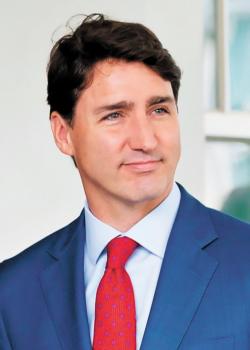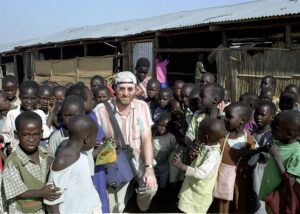
four years to make a mark.
(Photo by the Office of the
President of the United States)
While many candidates in the fall election campaign appealed to the self-interest of voters, organizations devoted to the interests of others had their own take on the outcome. I asked a few such agencies for their assessment of the last four years and their hopes for the next four. I also looked at foreign aid and the lot of Canada’s most prominent Mennonite politician.
MCC Ottawa
Anna Vogt of the Mennonite Central Committee (MCC) Ottawa Office says the 2015-19 government did well in terms of restoring funding for work with displaced Palestinians; appointing an Ombudsperson for Responsible Enterprise, who oversees Canadian-owned extractive companies abroad; and supporting Bill C-262, which would further commit government to the United Nations Declaration on the Rights of Indigenous Peoples. The bill ultimately died in the Senate before this fall’s election was called. (See a related story here.)
One disappointment for Vogt was the renewal of the Canadian military mission in Iraq.
Looking ahead, she would like to see the Ombudsperson for Responsible Enterprise given more independence and investigative powers. She would like to see renewed commitments to meet promises to Indigenous peoples, and she would like to see Canada take a lead role in work towards “a just peace in Palestine and Israel.”
Vogt says the Ottawa Office is still developing its approach with respect to Indigenous peoples, climate change and restorative justice. An increase in staff capacity, first announced last January, remains on the horizon. This will be partly in response to MCC cuts to Indigenous and restorative justice capacity elsewhere within MCC earlier this year.
Foreign aid
In 1970, the United Nations agreed that nations should aim to spend 0.7 percent of their gross national income (GNI) on Official Development Assistance. That target was re-affirmed by the UN in 2015. Despite leading the push for the original target, Canada has never come near to meeting it. Last year, this country was at 0.28 percent. The closest it came was 0.47 percent, under Progressive Conservative prime ministers Brian Mulroney and Joe Clark.
During the recent election campaign, the Conservative party said it would cut foreign aid by 25 percent. The Liberal platform touted a 2018 increase of $2 billion in aid and an unspecified further increase in 2019. According to election materials from the Canadian Council on International Cooperation, given that the $2 billion is to be spread over five years and the 2019 increase is minimal, Canadian aid-to-GNI ratio will remain relatively unchanged in coming years, assuming GNI rises.
The New Democratic, Green and Bloc Quebecois parties all stated a commitment to the 0.7 percent target.
CoSA
In 14 communities across Canada, Circles of Support and Accountability (CoSA) staff and volunteers support sex offenders released from prison. Celebrating 25 years, CoSA’s motto is: “No more victims—No one is disposable.” Evidence shows it has been successful in reducing re-offence rates.
In June 2017, the federal Liberal government entered a five-year funding agreement, with $7.5 million to be distributed to 14 CoSA operations across Canada over the five years. National CoSA coordinator Kathryn Bliss says the work under this arrangement is “going really well.”
But with more funding, more could be done. Close to half of the 14 CoSA operations are at or beyond capacity, and CoSA is not able to meet the demand for services across Canada. Bliss says $7.5 million is the maximum available under that particular funding stream and funding is not renewable.
Looking ahead, Bliss hopes to continue good relations with government and the bureaucracy. She also hopes to find a new long-term sustainable funding mechanism when the current arrangement expires in 2022.
Saudi Arabia
Last year, Canadian arms makers sold more weapons abroad than ever before. Of particular note, sales to Saudi Arabia topped $1 billion.
As Project Ploughshares notes in its materials: “Saudi Arabia has an appalling human-rights record and is a lead party in the war in Yemen, described as the ‘world’s worst humanitarian crisis’ by United Nations Secretary-General António Guterres. Evidence indicates that Saudi forces have used Canadian-made light-armoured vehicles in hostile actions, while other Canadian-made weapons have been diverted to Saudi-allied militias.”
During the campaign, the Liberals said they are “continuing to review export permits to Saudi Arabia and no final decision has been made.” They first announced such a review in late 2018.
The NDP and Greens oppose arms sales to Saudi Arabia.
Refugee resettlement
Response to the Syrian refugee crisis became a signature issue for the previous government, driven, in part, by the photo of three-year-old Alan Kurdi’s lifeless body on a beach, which shocked the world in the lead-up to the 2015 election. Brian Dyck of MCC says the previous government met its commitment to settle 25,000 Syrian government-assisted and blended refugees. In the process, the government sent an important message, and, Dyck says, the bureaucracy became more efficient, out of necessity.
In terms of privately sponsored refugees, some of whom MCC helped facilitate, there were about as many settled in Canada in the last four years as in the previous 20 combined. The annual target now is 20,000, and processing times have been shortened.
Dyck hopes the new government will continue to keep levels of government and privately sponsored refugees at current levels. “Canada has a role to play in terms of leadership globally,” he says, partly because the U.S. has significantly cut back its role.
Dyck also points to the importance of working with displaced people overseas and peacebuilding work that addresses root causes of displacement.
Independent
Also of note, former health minister Jane Philpott, whom Trudeau expelled from cabinet when she sided with Jody Wilson-Raybould in the SNC-Lavalin affair, finished third in the Markham-Stouffville riding, behind the Liberal and Conservative candidates. Philpott, who attends Community Mennonite Church in Stouffville, Ont., ran as an Independent.
In a statement the day after the election, Philpott said: “I still believe we can rise above the narrow confines of partisan politics, to work together on the biggest concerns of society and humanity. There are many who think it is naïve to believe that anything will change in politics. I hope, in time, we can set some of those sceptics free from the prison of the status quo.”








Leave a Reply
You must be logged in to post a comment.